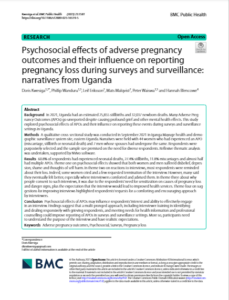
Abstract
Background
In 2021, Uganda had an estimated 25,855 stillbirths and 32,037 newborn deaths. Many Adverse Pregnancy Outcomes (APOs) go unreported despite causing profound grief and other mental health effects. This study explored psychosocial effects of APOs and their influence on reporting these events during surveys and surveillance settings in Uganda.
Methods
A qualitative cross-sectional study was conducted in September 2021 in Iganga Mayuge health and demographic surveillance system site, eastern Uganda. Narratives were held with 44 women who had experienced an APO (miscarriage, stillbirth or neonatal death) and 7 men whose spouses had undergone the same. Respondents were purposively selected and the sample size premised on the need for diverse respondents. Reflexive thematic analysis was undertaken, supported by NVivo software.
Results
60.8% of respondents had experienced neonatal deaths, 27.4% stillbirths, 11.8% miscarriages and almost half had multiple APOs. Theme one on psychosocial effects showed that both women and men suffered disbelief, depression, shame and thoughts of self-harm. In theme two on reactions to interviews, most respondents were reminded about their loss. Indeed, some women cried and a few requested termination of the interview. However, many said they eventually felt better, especially where interviewers comforted and advised them. In theme three about why people consent to such interviews, it was due to the respondents’ need for sensitization on causes of pregnancy loss and danger signs, plus the expectation that the interview would lead to improved health services. Theme four on suggestions for improving interviews highlighted respondents’ requests for a comforting and encouraging approach by interviewers.
Conclusion
Psychosocial effects of APOs may influence respondents’ interest and ability to effectively engage in an interview. Findings suggest that a multi-pronged approach, including interviewer training in identifying and dealing responsively with grieving respondents, and meeting needs for health information and professional counselling could improve reporting of APOs in surveys and surveillance settings. More so, participants need to understand the purpose of the interview and have realistic expectations.